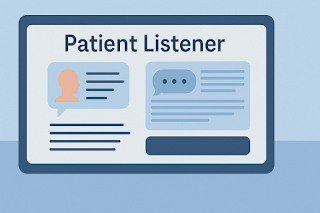In modern medicine, one of the most powerful diagnostic tools isn’t found in a lab—it’s the patient’s story. This is the foundation of narrative medicine, a field that recognizes the act of listening to a patient's narrative as essential to healing.
But let’s be honest: most doctors don’t have time to listen deeply. Primary care visits average just 15 minutes. Specialists often focus on one body system. And too many patients leave appointments feeling unheard, misunderstood, or fragmented.
So what if technology could help bridge that gap?
The Promise of Narrative Medicine
Narrative medicine emphasizes empathy, reflection, and connection. When patients are encouraged to tell their full story—not just a list of symptoms, but the context, emotions, beliefs, and life circumstances that surround those symptoms—clinicians gain critical insight. They see the whole person, not just a diagnosis.
But truly practicing narrative medicine requires time, presence, and deep listening—resources that are stretched thin in today’s healthcare system.
Enter Generative AI: The 24/7 Patient Listener
Generative AI, like ChatGPT, Claude, or Gemini, is emerging as a surprising ally. These tools can serve as Patient Listeners—a place where someone can speak freely, think aloud, organize their thoughts, and build a narrative that reflects their inner world and physical reality.
Here’s how it works:
-
You talk. It listens. Whether by typing, voice-to-text, or structured journaling, AI can absorb your full story without interruption or judgment.
-
It helps you sort yourself out. Through reflection, questions, summaries, or gentle reframing, AI can clarify patterns, spotlight emotional triggers, and connect dots between sleep, stress, pain, behavior, and belief.
-
It prepares you for your doctor visit. Once your story is organized, AI can help you summarize it into a brief health history, symptom timeline, or list of priority questions—giving your doctor exactly what they need, efficiently.
-
It never rushes you. Unlike overbooked clinics, AI has time. And that alone can be healing.
A Use Case: From Chaos to Clarity
Imagine someone struggling with fatigue, brain fog, and chronic digestive issues. They feel overwhelmed and unheard. Using an AI assistant, they begin to unpack their story:
“I’ve been exhausted for months. Mornings are the worst. I’ve tried cutting out gluten, but my stomach still acts up. I’m also under a lot of stress—my mom’s been sick, and I work two jobs.”
The AI reflects back:
“It sounds like your fatigue and gut issues have been persistent and may be worsened by emotional stress. Would it help to create a timeline or note when these symptoms feel better or worse?”
Over time, the user builds a holistic snapshot of their health. When it’s time to see the doctor, they’re ready with a clear summary that honors both science and story.
A New Partnership
This isn’t about replacing doctors—it’s about amplifying what’s already possible when medicine meets meaning.
Generative AI can be:
-
A mirror for self-reflection
-
A translator for complex experiences
-
A bridge between overwhelmed patients and time-pressed providers
Doctors still diagnose, treat, and guide care. But patients come to those visits more prepared, more empowered, and more understood.
Moving Forward
If we truly want person-centered care, we need person-centered tools. Narrative medicine taught us the value of the story. Generative AI can help us tell it—clearly, fully, and at our own pace.
It’s time to rethink what "patient communication" means in the digital age. The doctor may be busy. But the Patient Listener is always ready.
Let’s build a future where AI and empathy work hand in hand. If you’ve used ChatGPT or another AI to reflect on your health story or prep for a doctor visit, I’d love to hear your experience in the comments.
#NarrativeMedicine #GenerativeAI #PatientEmpowerment #HealthTech #AIForGood #DigitalHealth #DoctorPatientCommunication
Thanks to Generative AI, Google Bard/Gemini and ChatGPT, for help preparing this article.
If you like my work, please check out my Author Page. Thanks!
Disclaimer - For informational purposes only. This article is not a substitute for professional medical advice. Always consult a qualified healthcare provider. Additional Disclaimers here.


No comments:
Post a Comment